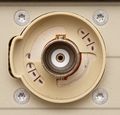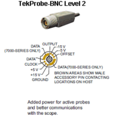Tekprobe BNC connector: Difference between revisions
No edit summary |
No edit summary |
||
| (26 intermediate revisions by 2 users not shown) | |||
| Line 1: | Line 1: | ||
[[File:Tekprobe_2_interface.png|250px|thumb|right|Tekprobe-BNC interface]] | [[File:Tekprobe_2_interface.png|250px|thumb|right|Tekprobe-BNC interface]] | ||
The '''Tekprobe BNC''' interface was introduced in 1986 and is widely used in 1990s Tektronix equipment to interface active probes (e.g. the [[P6243]]) to oscilloscopes. | The '''Tekprobe BNC''' interface was introduced in 1986 and is widely used in 1990s Tektronix equipment to interface active probes (e.g. the [[P6243]]) to oscilloscopes. | ||
It is a downward-compatible successor to the [[BNC connector with readout ring]] used in earlier instruments like the [[7000 series scopes]]. | |||
It consists of a plain [[BNC connector]] that allows traditional BNC based connections such as from passive probes. | It consists of a plain [[BNC connector]] that allows traditional BNC based connections such as from passive probes. (See [[Patent US 4708661A]].) | ||
This connector is surrounded by contact pads carrying power and data. The two larger pad areas match the | This connector is surrounded by contact pads carrying power and data. | ||
simple resistive readout pins | The two larger pad areas match the simple [[BNC connector with readout ring|resistive readout pins]], with division factors encoded as resistance to ground, although TekProbe BNC-era instruments accept values that earlier instruments did not. | ||
The smaller pads carry +15 V, +5 V, −5 V and −15 V power, an offset voltage (-1 V to +1 V) supplied and controlled by the mainframe, and a clock/data signal pair for serial communication between the mainframe and "smart" probes. | |||
power, an offset voltage supplied controlled by the mainframe, and a clock/data signal pair for serial | Probes are allowed to draw max. 1.25 W, max. 75 mA from the ±5 V rails, and max. 25 mA from the ±15 V rails. | ||
communication between the mainframe and "smart" probes. | |||
A [[Tekprobe SMA connector|similar standard]] exists based on [[SMA connector]]s, suitable for higher frequencies. | A [[Tekprobe SMA connector|similar standard]] exists based on [[SMA connector]]s, suitable for higher frequencies. | ||
[[File:Tek_Interface_Evolution.png | thumb | 400px | right | Evolution of Tektronix probe interfaces (click to enlarge)]] | |||
==Used in== | ==Used in== | ||
{| | {| | ||
! Scopes | ! Scopes | ||
! Plug-ins | |||
! Probes | ! Probes | ||
|- | |- | ||
| valign="top" | | | valign="top" | | ||
* [[TDS300 series]] | * [[TDS310|TDS300 series]] | ||
* [[TDS400 series]] | * [[TDS460|TDS400 series]] | ||
* [[TDS500|TDS500 series]] | * [[TDS500|TDS500 series]] | ||
* [[ | * [[TDS640|TDS600 series]] | ||
* [[ | * [[TDS744|TDS700 series]] | ||
* [[TDS3000B|TDS3000B series]] | * [[TDS3000B|TDS3000B series]] | ||
* [[TDS5000B series]] | * [[TDS5000B series]] | ||
| Line 31: | Line 32: | ||
* ... | * ... | ||
| valign="top" | | | valign="top" | | ||
* [[11A72]] | * [[11A32]] | ||
* [[11A33]] | |||
* [[11A34]] | |||
* [[11A52]] | |||
* [[11A71]], [[11A72]] | |||
* [[11A81]] | |||
* ... | * ... | ||
| valign="top" | | | valign="top" | | ||
* [[P6205]] | * [[P5205]], [[P5210]] | ||
* [[P6203]], [[P6204]], [[P6205]] | |||
* [[P6217]] | |||
* [[P6231]] | |||
* [[P6250]], [[P6251]] | * [[P6250]], [[P6251]] | ||
* [[P6243]] | * [[P6241]], [[P6243]], [[P6245]] | ||
* [[P6246]], [[P6247]], [[P6248]] | |||
* [[P6249]] | |||
* [[P6330]] | |||
* [[P6701]](-A,B), [[P6702]], [[P6703]](-A,-B) | |||
* [[P6711]], [[P6713]] | |||
* [[TCP202]] | |||
* [[ADA400A]] | |||
* [[013-0278-00]] | |||
* ... | * ... | ||
|- | |- | ||
|} | |} | ||
==Links== | |||
* [https://www.tek.com/support/faqs/what-tekprobe-interface What is the TekProbe interface?] (Tektronix FAQ) | |||
* [https://www.tek.com/support/faqs/what-difference-between-tekprobe-and-tekconnect-probe-interfaces What is the difference between the Tekprobe and TekConnect probe interfaces?] (Tektronix FAQ) | |||
* [https://btbm.ch/a-usb-power-supply-for-the-tekprobe-interface/ A USB power supply for the tekprobe interface] | |||
==Pictures== | ==Pictures== | ||
<gallery> | <gallery> | ||
Tekprobe_connector.jpg | Tekprobe BNC connector (socket) | |||
Tekprobe BNC plug.jpg | Tekprobe BNC plug (on [[P5210]]) | |||
Tekprobe BNC socket.jpg | Tekprobe BNC socket (on [[1103]]) | |||
Tekprobe_2_interface.png|Tekprobe-BNC interface | |||
tcp202-3.jpg | Tekprobe plug | |||
</gallery> | </gallery> | ||
[[Category:Coaxial connectors]] | [[Category:Coaxial connectors]] | ||
[[Category:Probe interfaces]] | |||
[[Category:Introduced in 1986]] | [[Category:Introduced in 1986]] | ||
Latest revision as of 09:32, 26 March 2024

The Tekprobe BNC interface was introduced in 1986 and is widely used in 1990s Tektronix equipment to interface active probes (e.g. the P6243) to oscilloscopes. It is a downward-compatible successor to the BNC connector with readout ring used in earlier instruments like the 7000 series scopes.
It consists of a plain BNC connector that allows traditional BNC based connections such as from passive probes. (See Patent US 4708661A.)
This connector is surrounded by contact pads carrying power and data. The two larger pad areas match the simple resistive readout pins, with division factors encoded as resistance to ground, although TekProbe BNC-era instruments accept values that earlier instruments did not.
The smaller pads carry +15 V, +5 V, −5 V and −15 V power, an offset voltage (-1 V to +1 V) supplied and controlled by the mainframe, and a clock/data signal pair for serial communication between the mainframe and "smart" probes. Probes are allowed to draw max. 1.25 W, max. 75 mA from the ±5 V rails, and max. 25 mA from the ±15 V rails.
A similar standard exists based on SMA connectors, suitable for higher frequencies.

Used in
| Scopes | Plug-ins | Probes |
|---|---|---|
Links
- What is the TekProbe interface? (Tektronix FAQ)
- What is the difference between the Tekprobe and TekConnect probe interfaces? (Tektronix FAQ)
- A USB power supply for the tekprobe interface




